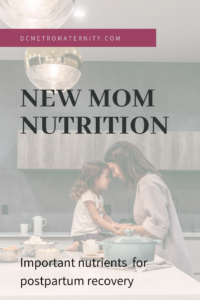During pregnancy, it’s normal to think a lot about food and nutrition.
When you’re in the first trimester, you might be trying to eat so that the morning sickness isn’t worse. And cravings are so common, that it’s easy to become a bit obsessed with what you’re eating next.
You might also be thinking about avoiding foods that your doctor says are unsafe, and eating your best so that you have good nutrition as you grow your baby.
But once you’ve had your baby, it can become a bit unclear what you need to do about your postpartum nutrition.
Should you be trying to lose the baby weight with a diet? Is there something that you need to replace in your body after birth? Are there foods you need to avoid when breastfeeding, or do need to eat certain things to make milk come in?
The good news is that if you’re otherwise healthy, postpartum nutrition can be simple (assuming you have no other health concerns). There are just a few things to keep in mind (in addition to staying in touch with your medical provider).
First off, let’s address this whole “postpartum snapback” and calorie counting.
How many calories should you eat as a new mother?
No matter how important body size and losing weight is to you, we don’t recommend dieting soon after birth. Experts consistently recommend that new mothers eat around 1800 calories per day.
You get to do whatever it is that makes you feel good in your body. Please remember though, that you are not obligated to be the same size as you were prior to pregnancy at any specific time. (Unless of course you’re Beyonce prepping for Coachella, which is another can of worms.)
A sharp drop in calories can lower your energy stores, which may already be low while adjusting to life with your new baby.
If you plan to breastfeed, it’s also important to eat enough calories in order to protect your milk supply.
Speaking of breastfeeding, do you need to eat certain foods to make milk for your baby?
The good news is that your body doesn’t need special ingredients for breastmilk. Unlike a Pinterest cake recipe, breastmilk is not complicated for your body to make. Unless you’re encountering a problem, your body will prioritize making milk. I often tell doula clients and childbirth education students that your body will make fresh and healthy breastmilk out of McDonald’s dollar menu cheeseburgers, if that’s what you give it to work with.
While you may be tempted to eat what they call galactagogues (herbs and foods designed to increase milk supply), just work on the fundamentals of breastfeeding- a good latch and effective nursing or pumping routine.
I recommend seeing a lactation consultant before turning to herbal remedies, as they have their own side effects.

So does nutrition matter at all in the postpartum period?
Yes, absolutely! Just because your baby will thrive no matter what you eat, doesn’t mean that there aren’t certain nutrients that you should be aware of.
Similar to during pregnancy, you need to be conscious of just a few key nutrients, postpartum.
Iron: Iron is critical in making new red blood cells. Birth, even uncomplicated childbirth, involves a lot of blood loss during delivery, and you’ll need to replenish this. It’s recommended that women eat 9 mg of iron daily. Fortunately, iron is easily available in food through red meat, poultry, beans and leafy green veggies like spinach.
It can also be helpful to up your vitamin C intake during this time, to increase iron absorption.
Protein: Protein enables you to build new cells and recover, similarly to iron. It also helps with fullness and satisfaction, which is important if you’re feeling hungry while breastfeeding, or generally depleted after birth. Animal or plant protein meets this need and you should aim for 70 to 80 grams per day.
Calcium: During pregnancy and while breastfeeding, your body prioritizes your baby’s need for calcium as their bones grow, so it’s important for you to take in enough for you to stay strong as well.
How do I meet my postpartum nutrition needs?
The simplest way to do this is to eat a variety of foods, with lots of fruits and veggies. A quick tip is to fill half your plate with plants, being sure that things are colorful. Then add a protein source (and there’s no need to be afraid of fat).
Many of our doula clients also continue to take their prenatal vitamin for a time, which ensures that they have the backup of a supplement.
Once you’ve done all of this work on your postpartum nutrition, just drink lots of water (it often helps to put a glass of water near where you feed your baby, and drink when she does).
Then, feel satisfied that you’ve taken good care of yourself and your postpartum nutrition*.
*Please, as always, consult your medical provider or other health professionals such as a dietitian for specific recommendations.
Be sure to check out our online pregnancy course designed for women of color, Attain.


